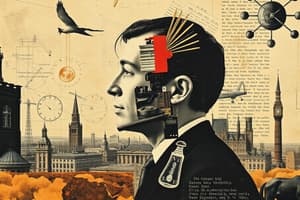Podcast
Questions and Answers
Which literary standard emphasizes the ability of a work to resonate with readers regardless of their background or era?
Which literary standard emphasizes the ability of a work to resonate with readers regardless of their background or era?
- Universality (correct)
- Suggestiveness
- Intellectual Value
- Artistry
A literary work that continues to be relevant and appreciated centuries after it was created primarily demonstrates which literary standard?
A literary work that continues to be relevant and appreciated centuries after it was created primarily demonstrates which literary standard?
- Style
- Permanence (correct)
- Timeliness
- Intellectual Value
If a narrator describes events using "I" and shares personal thoughts and feelings, which point of view is being used?
If a narrator describes events using "I" and shares personal thoughts and feelings, which point of view is being used?
- Second Person
- Third Person Omniscient
- Third Person Limited
- First Person (correct)
An author wants to explore the inner thoughts and feelings of multiple characters in their novel. Which point of view would best facilitate this?
An author wants to explore the inner thoughts and feelings of multiple characters in their novel. Which point of view would best facilitate this?
Which of the following best describes the 'form' ingredient of literature?
Which of the following best describes the 'form' ingredient of literature?
Which literary element is MOST useful for understanding the social, economic, and political influences interwoven within a text?
Which literary element is MOST useful for understanding the social, economic, and political influences interwoven within a text?
A historical fiction novel vividly portrays the daily life of Filipinos during the Spanish colonization period. Which element would MOST enhance a reader's understanding of the nuances of power dynamics present in the narrative?
A historical fiction novel vividly portrays the daily life of Filipinos during the Spanish colonization period. Which element would MOST enhance a reader's understanding of the nuances of power dynamics present in the narrative?
In evaluating a poem, a critic focuses on the author's word choices and sentence structures to understand deeper meanings. Which approach is the critic primarily employing?
In evaluating a poem, a critic focuses on the author's word choices and sentence structures to understand deeper meanings. Which approach is the critic primarily employing?
Which of the following is TRUE regarding the relationship between literature and history?
Which of the following is TRUE regarding the relationship between literature and history?
What distinguishes prose from poetry, beyond simply its structure?
What distinguishes prose from poetry, beyond simply its structure?
Which comprehension skill involves interpreting implicit meanings by using hints and clues from the text?
Which comprehension skill involves interpreting implicit meanings by using hints and clues from the text?
If a reader is asked to express their opinion on the themes presented in a novel, which type of comprehension are they primarily using?
If a reader is asked to express their opinion on the themes presented in a novel, which type of comprehension are they primarily using?
Which of the following pre-colonial literary forms is best described as a song used to put a child to sleep?
Which of the following pre-colonial literary forms is best described as a song used to put a child to sleep?
A student is analyzing a piece of literature for its use of imagery and symbolism. Which of the following is the student engaging in to help understand the literary context?
A student is analyzing a piece of literature for its use of imagery and symbolism. Which of the following is the student engaging in to help understand the literary context?
What is the primary function of peer assessment in an educational setting?
What is the primary function of peer assessment in an educational setting?
Which of the following literary works is an example of religious drama during the Spanish Colonization Period?
Which of the following literary works is an example of religious drama during the Spanish Colonization Period?
Which literary form, introduced during the American Colonization Period, deviates from traditional metered patterns and rhyme schemes?
Which literary form, introduced during the American Colonization Period, deviates from traditional metered patterns and rhyme schemes?
During which period in Philippine literary history was the use of English as a medium of expression most encouraged?
During which period in Philippine literary history was the use of English as a medium of expression most encouraged?
A literary work is adapted into a movie. Which of the following options BEST describes this process?
A literary work is adapted into a movie. Which of the following options BEST describes this process?
What is implied when 'Bagong hari, bagong ugali' is used in a conversation related to a country's election?
What is implied when 'Bagong hari, bagong ugali' is used in a conversation related to a country's election?
Flashcards
Literature
Literature
Verbal expression that encapsulates human experience through various forms.
Literary Standards
Literary Standards
Criteria that define the quality of literature, including universality and artistry.
Three Ingredients of Literature
Three Ingredients of Literature
Essential components include subject, form, and point of view.
First Person POV
First Person POV
Signup and view all the flashcards
Third Person Omniscient
Third Person Omniscient
Signup and view all the flashcards
Prose
Prose
Signup and view all the flashcards
Poetry
Poetry
Signup and view all the flashcards
Biographical Context
Biographical Context
Signup and view all the flashcards
Inferential Comprehension
Inferential Comprehension
Signup and view all the flashcards
Evaluative Comprehension
Evaluative Comprehension
Signup and view all the flashcards
Literary Adaptation
Literary Adaptation
Signup and view all the flashcards
Free Verse
Free Verse
Signup and view all the flashcards
Spanish Colonization Literature
Spanish Colonization Literature
Signup and view all the flashcards
Haiku
Haiku
Signup and view all the flashcards
Fable
Fable
Signup and view all the flashcards
Epic
Epic
Signup and view all the flashcards
Literary Text
Literary Text
Signup and view all the flashcards
Cenakulo
Cenakulo
Signup and view all the flashcards
Study Notes
Literary Standards
- Universality: Appeals to everyone
- Artistry: Aesthetic appeal
- Intellectual Value: Stimulates critical thinking
- Suggestiveness: Evokes emotional power
- Spiritual Value: Elevates the spirit
- Permanence: Endures across time
- Timeliness: Occurs at a particular time; Timelessness: Remains invariable throughout time
- Style: Presents unique way
Three Ingredients of Literature
- Subject: Focus; can be emotion, object, abstract idea, or event
- Form: Verbal and artistic structuring of ideas (poem, story, drama)
- Points of View: Narrator's perspective. Determines the story's nature.
Types of Point of View
- First Person POV: Narrator's own views ("I"), expressed in their words
- Third Person Omniscient POV: All-knowing; sees all characters' minds
- Third Person Limited POV: Narrator only sees or hears "inside the world" of the story.
What is Literature?
- Derived from Latin "litera" (letter)
- Deals with human ideas, thoughts, and emotions; Man's story
- Recorded human experience in beautiful language is Literature; Loves, griefs, thoughts, dreams and aspirations.
Literature and History
- Closely related; recorded customs, traditions, aspirations, etc. are in literature.
Literary Compositions Influencing the World
- The Bible/Sacred Writings
- Quran
- The Iliad & The Odyssey
- The Mahabharata
- Canterbury Tales
- Uncle Tom's Cabin
- Divine Comedy
- El Cid Compeador
- The Song of Roland
- Book of the Dead
- Book of the Days
- One Thousand and One Nights/Arabian Nights.
General Types of Literature
- Prose: Ordinary conversational language; distinguished by tone, pace, focus.
- Poetry: Expressed in verse; concentrated imaginative form. Distinguished from prose by tone etc.
Biographical Context
- Author's life background
- Educational background
- Professional background: career, milestones
- Socioeconomic background: family
Linguistic Context
- Words to convey meaning
- Increase understanding. Close attention needed.
Literary Comprehension
- Literal Comprehension: Reading the lines (who, what,when,where,why,how)
- Inferential Comprehension: Reading between the lines; context clues
- Evaluative Comprehension: Imagination, generalizations, conclusions, critical thinking.
Socio-cultural Context
- Understanding social, economic, political, cultural forces
- Combination of social and cultural elements.
Literary Adaptation/Text/Assessment
- Literary Adaptation: Adapting a literary source
- Literary Text: Written work (book, poem)
- Peer Assessment: Student work evaluated by peers
- Self-Assessment: Students assessing their performance
Specific Authors/Works (Pre-Colonial, Spanish, American, Japanese)
- Fay Cooper Cole & Mabel Cook Cole: Compiled Philippine folktales.
- Pre-Colonial Period: Indigenous rituals, folk songs, narratives, proverbs
- Spanish Colonial Period: Religious drama (e.g., panunuluyan, senakulo), zarzuela, moro-moro, awit, korido
- American Colonial Period: English language, free verse poetry, short stories, novels, critical essays.
- Japanese Colonial Period: Limited use of language; haiku, tanaga.
Studying That Suits You
Use AI to generate personalized quizzes and flashcards to suit your learning preferences.




